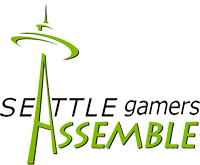Weekly Short-Shots
Contents
Here's a summary of lessons learned by members of Seattle Gamers Assemble! (SGA) after several years of running weekly game events. You can see a partial overview of some of the games we've played on the SGA Gaming Night Archive.
In this section, we assume that you already have some sort of a community to start from: a local mailing list, a gaming circle, a game club, a Meetup group, etc. If not, you may want to read Forming a Gaming Community first.
Where and When
Some important considerations about the logistics of the games. First off, you should know that you have to make your weekly event a convenient no-brainer to find. If people have to spend time figuring out:
- the location and time,
- how to get there,
- what's the closest bus route,
- is there any food nearby,
- can you bring food and drinks inside,
- is there a cover charge,
Etc., you will lose some of them -- perhaps to many to keep your event alive.
Scheduling
If you have a game at a set time on a set day, it's easier for people to remember and plan for it. Ideally, a game every week really becomes part of everyone's mental landscape. You may not be able to hold a game so often; if you have to plan a lower frequency (every other week, twice a month, monthly, quarterly, etc.), be ready for more coordination work, more reminders, and more promotion. It's all trade-offs!
We at SGA try to have a game every week; we've found this to be most effective. That means that some dedicated people are always ready with a back-up game if there is a cancellation (more on this later).
Location
Again, consistence is preferable. When we first started our Monday night short-shots, we used to meet at various gaming stores, wherever we could find free space. One thought was that this would help various gaming stores by spreading the business. Eventually, we came to the conclusion that there were more benefits than advantages:
- We couldn't be sure to get space every week.
- We spent a lot of effort coordinating both with our members ("Where is the game this week?") and with the store owners.
- If there were last minute changes, it made it hard to find people to warn them.
- The spaces available were not always optimal (too small, too hot, too cold, too noisy, competing with other groups for space, etc.)
- Bus routes were not always convenient.
So we decided we needed to hold the game at the same location every time.
Calendar
If you're reading this, you're probably online and Web-savvy (unless one of your friends took the time to print this for you.) So the tool you definitely should useto make your life easier
Games
Making sure you have some games to play every week.
Indie, Oldie, Oddball
A Game in your Back Pocket
Playtesting
Promoting
Getting people to come to the games.
Trailers
Posters
Welcoming
Growing
Baby steps!
Return to Seattle Gamers Assemble!
